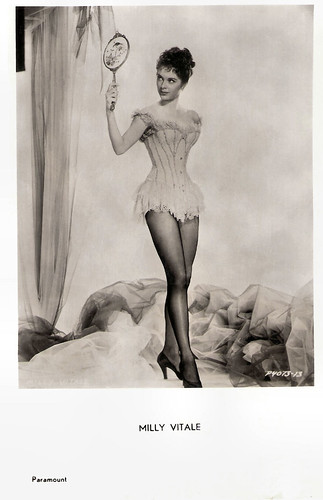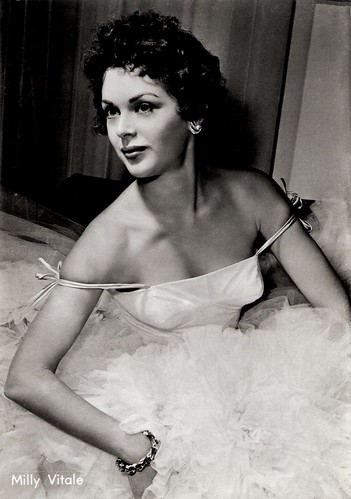
French postcard by Editions P.I., no. 670. Photo: Paramount, 1955.
An innocent girl thrown into a dungeon
Camilla ‘Milly’ Vitale was born in 1933 in Rome, Italy. She was the daughter of conductor Riccardo Vitale, the director of the Rome opera house, and white-Russian choreographer Natasha Shidlowski.
At the age of 15, Milly made her film debut in the Dostoyevsky adaptation I fratelli Karamazoff/The Brothers Karamazoff (Giacomo Gentilomo, 1947), starring Fosco Giachetti. She played her first leading role in the historical melodrama La sepolta viva/Buried Alive (Guido Brignone, 1949) as an innocent girl thrown into a dungeon.
Vitale had her breakthrough in the political drama Anni Dificile/The Difficult Years (Luigi Zampa, 1950). Hal Erickson at AllMovie: “The Difficult Years is another uncompromising neorealist exercise by Italian filmmaker Luigi Zampa. The title refers to the years that Italy spent under the thumb of fascism. It is Zampa's thesis that the majority of Italian citizens preferred to ignore Mussolini's trampling of human rights and his ever-increasing megalomania, so long as they were left in peace.”
Another interesting film is the realistic mafia drama Gli inesorabili/The Fighting Men (Camillo Mastrocinque, Roberto Savarese, 1950), starring Rossano Brazzi. Other films in which she appeared were the war-drama Il Caimano del Piave/The Caiman of the Piave River (Giorgio Bianchi, 1951) with Gino Cervi, the romance-drama Il Tenente Giorgio/Lieutenant Giorgio (Raffaello Matarazzo, 1952) starring Massimo Girotti, and the Swashbuckler A fil di spade/At Sword's Edge (Carlo Ludovico Bragaglia, 1952).
Vitale appeared in a few Hollywood movies like The Juggler (Edward Dmytryk, 1953), a drama about a survivor of the Holocaust, played by Kirk Douglas. In her most notable American role, she co-starred with Bob Hope in The Seven Little Foys (Melville Shavelson, 1956). However she never achieved star status like her contemporaries Sophia Loren and Gina Lollobrigida, and returned to Europe.
In England, she made The Flesh Is Weak (Don Chaffey, 1957) and the war film Battle of the V-1 (Vernon Sewell, 1958), starring Michael Rennie. In Italy, she appeared in the Italian-American coproduction War and Peace (King Vidor, 1957) and the historical epic Annibale/Hannibal (Edgar G. Ulmer, 1959) based on the life of Hannibal (Victor Mature).

Italian postcard by Bromofoto, Milano, no. 667. Photo: Minerva Film.

Vintage postcard by Bromofoto, Milano, no. 1199.
The Queen of France
In 1960, Milly Vitale married the American Vincent Hillyer. The marriage produced two sons, Edoardo (1961) and Vincent Jr. (1964). Hillyer’s wife by a previous marriage had been a princess of the Iranian Pahlevi dynasty. Hillyer had converted to Islam, and, as an honorary Iranian citizen, had close ties with the government in Teheran.
In May 1961, Hillyer and Vitale sued the Pan American Petroleum Corporation of Tulsa, Oklahoma, to the tune of $30 million for allegedly reneging on an agreement to pay them an annuity of $25,000 and a 2 1/2 % share in net profits in exchange for Hillyer interceding with the Iranian government on an oil exploration contract. The couple divorced in 1966.
Vitale returned to the screen in the Italian thriller Gangsters '70/Days of Fire (Mino Guerrini, 1968) starring Joseph Cotten. She played small parts in the comedies Il medico della mutual/The Family Doctor (Luigi Zampa, 1968) featuring Alberto Sordi, and Contestazione generale/General dispute (Luigi Zampa, 1970) starring Vittorio Gassman.
Vitale retired from acting in the 1970s. Her final film role was as the Queen of France in the Swashbuckler La grande avventura di Scaramouche/The great adventure of Scaramouche (Piero Pierotti, 1972). The film was originally completed in 1970 but not released until 1972 - after the death of director Piero Pierotti.
Milly Vitale died in 2006 in Rome. She had made nearly 50 films.

Vintage postcard. Photo: Paramount.

Vintage postcard by Bromostampa, Milano, no. 143.
Sources: Hal Erickson (AllMovie), Glamour Girls of the Silver Screen, Wikipedia, and IMDb.
1 comment:
Milly Vitale !
"Porta un bacione a Firenze..."
"If love can e'er a loving one inspire,
Most lovingly it gave me now its fire..."
Post a Comment